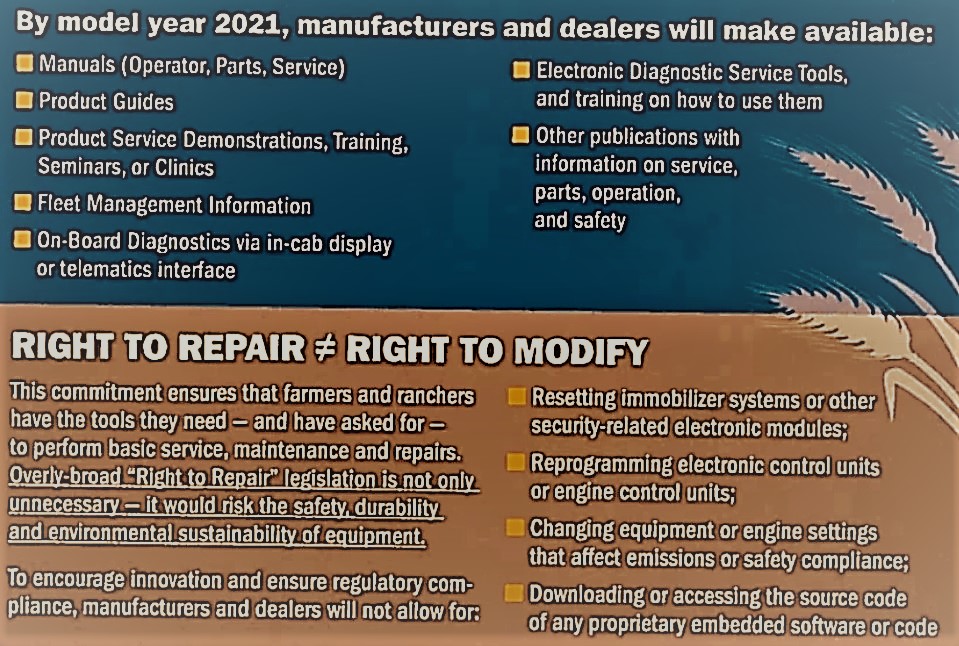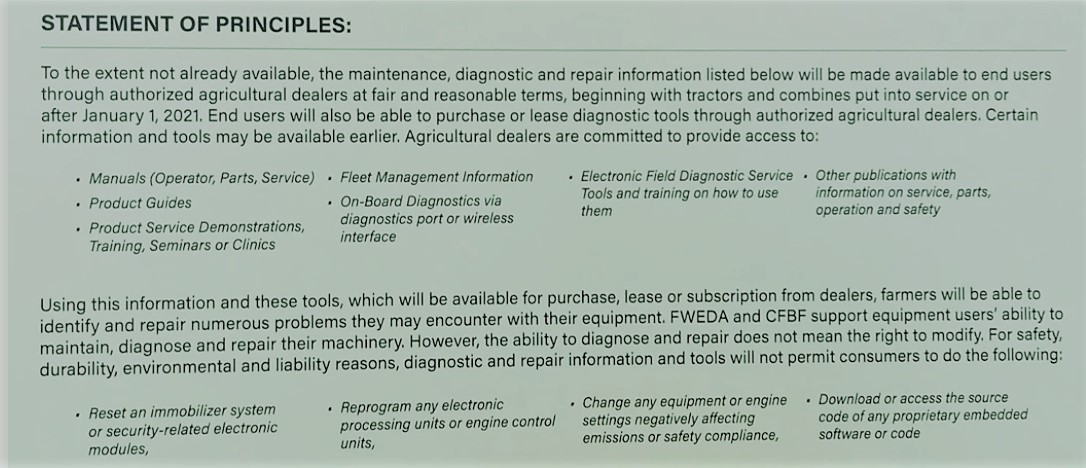Right to Repair – Freedom Vs Ability
By Dan Grider

We live in a cross over age. What was once all about hardware, is now becoming all about software.
Companies like John Deere, Apple, Toyota, and Samsung (among others) have designed products in such a way that only approved technicians can repair them. This might not sound like such a big deal with things like cell phones or TVs, which are relatively low cost. However, what about a tractor that can cost as much as a new home?
Lately it seems the brutish reality of rising repair bills, collecting downtime, and blurred lines of independence are closing in on farmers across the nation. And the right to repair your own property is turning into a thing of the past. Something that was once so unimaginable that it never gained a single thought. After-all, when companies like Deere first came to build the tractor market, some of the finer qualities were that their machines were easy enough to fix yourself.
The age of the backyard mechanic may be coming to an end. You know the type, and how good it felt to fix up your machine with them, maybe even a cold beer in hand.
With the designs of the latest models of tractors and combines John Deere is putting out, many farmers are left with mixed feelings. As of now due to the increase in software in nearly every component, even minor repairs are costing thousands. The main reason being; is that only a licensed John Deere technician can work on a new John Deere product?
The Iconic Company has even gone as far as requiring it’s customers to sign a contract at the time of purchase, which states that the buyer will not attempt home repairs on the equipment. They can face legal consequences if they do. The equipment is even designed in such a way that if the owner was to buy a replacement part (even from a dealer) the computer codes may still not sync up and the machine still won’t work. And let’s not even get into the problems you may go through if you try to use and aftermarket or good used part. Maybe try a little computer hacking – but only if you dare risk serious consequence in warranty or legal action.
As expected farmers are getting in touch with their ancestral nature and still turning to bootleg software from torrent websites to diagnose machinery problems. They need to get their equipment back in working order. They need to do it quick. And they need to do it affordably.
People in Ukraine and Eastern Europe often sell the bootleg software to farmers here in the states without the usual encryption. Big tech machinery companies obviously hate this; yet, it’s ironic they leave really no other choice.
At one end of the spectrum, big tech companies have prided themselves in revolutionizing the farm equipment industry, and they have often said as much. At the other end, one of the first revolutions in Agriculture in general, has its roots in making machinery easy and affordable – let’s go all the way back to the cotton loom if we have to. Or we can just take a look at the first John Deere plow. These inventions empowered the users with freedom and ease.
But big tech companies have smaller minds apparently, and they harp on saying that allowing access to their underlying software will risk the machine’s compliance with laws and governing emissions concerns, and when it comes to equipment that has been modified unbeknownst to the dealer and it shouldn’t be then traded or sold. This sounds more like they just want to control the market to me.
More than eighteen states have come up with bills that would require big tech companies to produce repair manuals and equipment for consumers, something big tech isn’t too thrilled about. In statements some voiced concerns that this would open the door to hackers and device counterfeiting (You mean aftermarket competition!?).
Some farmers have already done this, out of need. Is this just another example of the dangers of monopoly coming to be? This big tech attitude simply hurts the farmers with the increased repair costs, and the needless downtime; it also affects the small business owners that would normally repair farm equipment. What about that local mechanic or that old salvage yard with those parts guys you actually trust? Headed towards extinction if some have their way I suppose. With business being taken from them at alarming rates, these small repair shops are facing a shaky future.
States that are trying to institute the “fair repair” bill acts are requiring manufactures to make available to the public the tools necessary so big ag-tech companies cant corner the market. These are least legislative bills trying to give the farmer, the mechanic, the repair shop all a fighting chance. In an article written by Laurie Bedford “Right to repair addressed by association of equipment manufacturers”, by 2021 equipment for basic service should be available for the public. This is a good step in the right direction, if certain companies can be held back… It’s almost a David vs. Goliath story. How can we hope to fight these billion dollar giants?
Is this really a war on repairs or modifications, or is it a battle for something more?
Companies like John Deere and Apple are getting the brunt of this little fiasco. Apple even recently admitted to secretly slowing down their older models with recent updates, and swapping batteries designed to fail. This in essence creates a backdoor way of forcing consumers to buy the latest product. And that’s a $500 phone, not a $500,000 tractor.
Could an Ag equipment company be capable of the same thing as Apple? After-all, is it in a company’s best interest making sure consumers are really going to have a machine that will last a lifetime with little to no problems? Or have we reached an age of mandatory services, up sells, and “updates” in an endless loop down the rabbit hole of needless costs?
Taking the farmer and trusted mechanic away from working on their own tractors, and threatening them with void warranties and supposed legal actions is just insane. Companies are making the issue worse themselves.
What about your ability to customize and innovate your own machinery? Everyone knows a gear head or two that love trying to make the loud louder, the fast faster, and the best better. That just a cornerstone that usually comes with owning something yet it sounds more like farmers are paying for the rights to just use the equipment not so much buying to own. Farmers are being forced to hack into their own tractors for something as basic as an oil change, fixing a beeping sensor, or swapping a worn out seat. Tom Schwarz a farmer in Nebraska stated “When you paid the money for a tractor, you don’t actually buy the tractor; all of the intellectual property is still theirs.” Now, is that right?
Farmers and mechanics across the U.S. are rallying together to campaign against big tech, and right here in California it’s no different. Nothing has yet been passed, but lately California’s own Farm Bureau has gotten into some hot water for seemingly agreeing to watered down stipulations that farmers were originally asking for. Basically, the Farm Bureau reached an understanding with the equipment dealers associations, and added more language to a proposed “Statement of Principles” where the two sides agreed that the “Right to Repair” was not the “Right to Modify” – which basically makes the agreement as broad as it’s ever been with no relevant change in the system.
This action may have effectively killed the right to repair movement altogether in California, just as we started to join the cause. And no one really knows why…
“When it is up to the manufacturer to decide what information to share and what to withhold, you haven’t addressed the problem,” Gay Gordon-Byrne, Executive Director of the Repair Association, which is leading the right to repair movement, told Motherboard in an email. “We’re also concerned that the agreement fails to mention anything about fair and reasonable pricing for parts, nor any mention of how farmers will get firmware, updates or patches.”
Why did the California Farm bureau potentially agree to what many critics are calling a “manufacturer centric” version of repair rights?
“This agreement does not end monopolization of farm equipment repair,” said Nathan Proctor, who is heading consumer rights group US PIRG’s right to repair efforts.
The past few years law makers and farmers have been going back and forth. Big Tech companies hold steadfast. Last year a bill went up in flames in New York after Apple and others lobbied hard, their biggest argument being costumer safety, fearing consumer injuries due to faulty third – party repairs.
Really?
Sounds like an easy enough problem to fix…..give consumers a repair manual!!! Allow techs to be trained! This is a new age of freedom vs. ability. These companies are testing customer loyalty.
Americans will always be Americans and we love our machines, we love the ability to do what we please. Big Ag Tech Companies seem like they are trying to take away the ability of a man to work on his own tractor, a tractor that he busted his backend to buy, so he could continue his family legacy, and afford a life for his wife and children.
It seems some companies think of it as just a matter of fact issue, and that farmers need to “get with the times”. Well, I doubt most of these guys farm anymore. Not like back in the day, when you went to the Equipment dealer, and he also happened to be your neighbor that owned a hundred acres or so himself.
Nope.
These companies either don’t get, or just plan forgot, what it means to replace a $250,000 piece of equipment or to start having to line up at midnight for some dam operating system update that just wastes a man’s time. I got better things to do myself. Let me just get to work.
All in all, we the people, the farmers, do have the last word. We just need to be sure to be in the conversation.
By Dan Grider
Ag Expo Magazine Contributor









